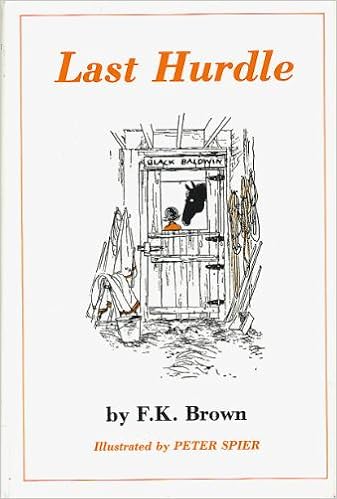F.K. Brown, il. Peter Spier
1953, Thomas Crowell (not shown)
With a sigh, she
tipped her head back and stared up at the soaring board sides of the barn.
Sunlight slid down through the open half of the stable door to bathe the big
box stalls with light. In her imagination, she saw heads moving among the
shadows behind the barred upper halves of the stalls, and she could almost hear
the soft fluttering of nostrils, the stamp of hoofs.
Katherine Nelson’s family has moved to a falling-down farm,
and although she has never been on or near a horse, she is determined to acquire
one. She’s already stalking the local horse owners, showing up when a nearby
farmer is taking his team in for the day and beguiling a ride:
Half of her mind kept
singing “This is the first time I’ve ever been on a horse! I’m riding a horse –
a horse!” while the other half kept trying to remember all the things she had
read in her horse books: how to grip with the knees, how to hold the reins in
both hands, how to keep the ankles straight, heels down. But she was far too
excited to think very clearly, so she just sat there, smiling happily to
herself and riding.
Kathy and obliging little brother Ned join finances to
liberate an abused, neglected horse from a careless owner, with the
encouragement of hired man Willie. Their
parents, initially amused at their game, realize suddenly that the kids aren’t
just being imaginative, they actually did manage to buy a horse.
“You what?” her mother
shrieked, rising from her chair and almost tipping it over in her haste. “You
did what? What on earth are you talking about?”
Kathy names the black horse with a white face Baldy, and
nurses him back to health. And
naturally, her thoughts turn to further achievement. Now that Baldy’s healthy again, she begins to
jump him and plots to enter him in a local show. The show, held at a country club over the
Memorial Day weekend, is very obviously over Kathy’s head – just figuring out
what classes to enter him in is difficult, and at every step, Kathy has doubts.
She imagined herself
falling off at the first jump; she heard the spatter of laughter from the
stands and the echo of a derisive bugle. Only too clearly, she saw Baldy
plowing through the rails, sending splintered wood flying in all directions.
And even before the show starts, Kathy runs into more
problems. There is, of course, a happy
ending with a victorious Kathy already starting to dream of more horses.
Brisk pace, nice style and funny little drawings. Well worth a read.
Other editions
1953 Crowell
1970 Apollo paperback
1988 Linnet Books
About the Author
Frieda Kenyon Brown (1920-2011)
Brown was born in Philadelphia to a father named,
wonderfully, Benjamin Franklin II (whose son was named Benjamin Franklin III);
her unusual middle name was her mother’s maiden name. Raised on an apple farm, she loved farm
life. She attended Bryn Mawr College and
joined the American Red Cross during World War II. She was awarded the Medal of
Freedom for her work in field hospitals in France and Germany with the 3rd
Army, and married Lt. William Douglas Brown in 1945. His military career kept them on the move,
but after he retired, they followed her father to North Carolina, where Brown
finally got a farm of her own in Pisgah Forest. She had 2 children.
As a writer, she mostly collaborated on nonfiction with Claude Frazier Albee, as well as writing under the pseudonym F.K.
Franklin. This appears to be her sole horsey book.
Oddities
The 2012 film version of the popular 2008 young adult novel The Hunger Games was filmed in the Pisgah National Forest.
Links





No comments:
Post a Comment